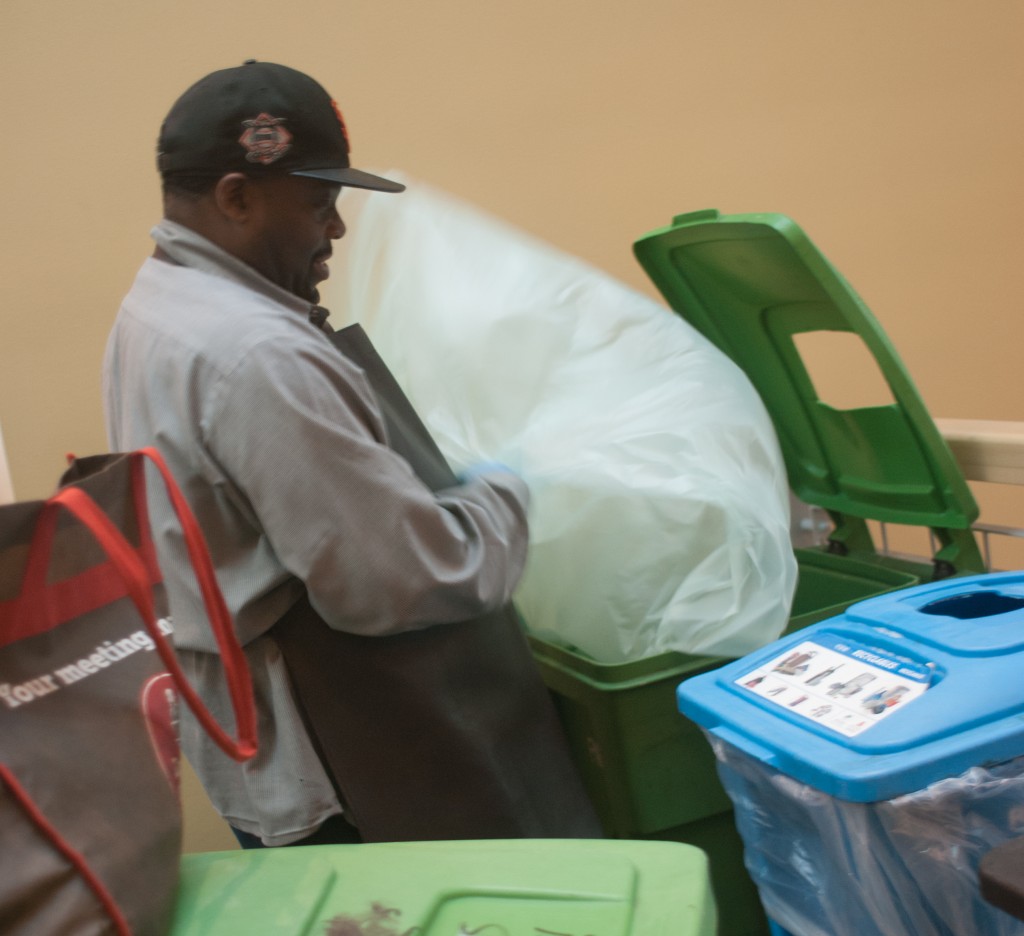City College Re-engages Environmental Sustainability Plan

the recycling at the MUB building at the Ocean Campus. (Photo by
Franchon Smith/ The Guardsman)
By Patrick Fitzgerald
(Part II of an investigative series on climate change)
City College administrators allowed the college’s 2009 Sustainability Plan to lapse as the accreditation crisis grew, leaving the campus community questioning the school’s commitment to finishing a long list of environmental goals and for creating a robust environmental studies program by 2018.
Sustainability is a concept of balance between the college’s operations and the school’s environment that avoids degrading its natural surroundings. 97 percent of the world’s climate scientists believe that climate change is happening and is very likely due to human activity as reported by NASA’s Goddard Institute for Space Studies.
“It’s an important issue for everyone because we as people try to live on this planet and not use up the resource,” Amber Baldwin, an City College accounting student said. “The only way to do that with increasing population is to maintain or reduce the levels of output.“
Environmental Damage
Degradation happens with the release of greenhouse gases like carbon dioxide and methane from cars, power plants, buildings and trash, all of which are part of the school’s operations. In December 2009, City College published a comprehensive sustainability plan dealing with air quality and water conservation as well as operations and resource management.
Jeff Hamilton, spokesperson for the college said Vice Chancellor Ron Gerhard’s office was organizing information on the school’s most recent environmental sustainability efforts. Hamilton stressed that some progress on sustainability had continued through the crisis.
“What’s gone right is that individuals still care and teachers and staff are at the forefront.”
— City College Recycling Coordinator Carlita Martinez
Hamilton stated that two administrative positions, left vacant during the accreditation crisis, are now in being filled. A new capital buildings manager and a buildings and grounds director would share prime responsibility for the college’s environmental sustainability efforts.
Yet, faculty members, who for years have sat on City College’s Sustainability Committee, are frustrated with the lack of coordination among the college community. The committee serves as a resource “to ensure effective partnership among departments, training programs, awareness campaigns, local community organizations, businesses, and the city of San Francisco’s department of the Environment.”
“I think we could do so much more with institutional support and awareness,” Latino services network counselor and sustainability committee Co-chair Anastasia Fiandaca said. “I had a student thanking me for having installed an electric vehicle charging station and was requesting more of them, and I have not been able to find out who approved that.”
Recycling Program
However, City College’s Recycling Program is making significant progress on dealing with trash generated by the college. From 2003 to 2013, the latest figures available, the program managed to reduce trash sent to the landfill by greater than 52 percent.
Not only is paper and waste that can be composted recycled, but also electronic waste, deconstruction materials, appliances, light bulbs, books, clothing and a host of other items amounting to 1,476 tons kept from the landfill in 2013. The recycling program estimates that as much as 80 percent of City College’s waste stream is recyclable.
“What’s gone right is that individuals still care and teachers and staff are at the forefront,” said Recycling Coordinator Carlita Martinez. “What’s gone wrong is it is not supported by the college as an institution and it hurts all phases of the operation which is way behind other colleges and in such a green city as San Francisco.”
The College Sustainability Plan was created by as many as 46 members, most of whom were from the college community and approved by the Board of Trustees in 2009. Part 1 of the plan deals with construction, retrofitting and operations and contains 62 steps to be enacted. Part 2 deals with integrating environmental sustainability into the school curriculum and culture.
Contact a reporter
Send an email to: Patrick Fitzgerald or tweet to @HitSquarely

Comments are closed.